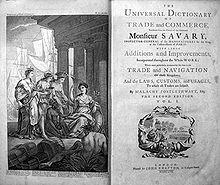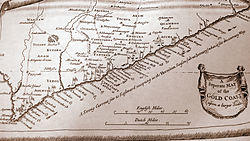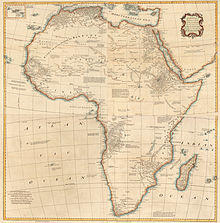Malachy Postlethwayt (1707–1767) was a British commercial expert famous for his publication of the commercial dictionary titled The Universal Dictionary of Trade and Commerce in 1757. The dictionary was a translation and adaptation of the Dictionnaire universel du commerce of the French Inspector General of the Manufactures for the King, Jacques Savary des Brûlons.[1]
Postlethwayt wrote several works on the benefits to the British economy from the African slave trade to the colonies in North America.
Life
Born May 5, 1707,[2] Postlethwayt was elected a Fellow of the Society of Antiquaries of London on 21 March 1734.[3] In 1743 he secured a position with the Royal Africa Company, and elected to its Court of Assistants (governing board) 17 January, 1744. He wrote in the company's defence over the next two years.[4]
Postlethwayt died suddenly on 13 September 1767. He was buried in the Old Street churchyard, in Clerkenwell.[3]
Works
Postlethwayt spent 20 years preparing The Universal Dictionary of Trade and Commerce, London, 1751 (3rd edit. London, 1766; 4th edit. London, 1774), a translation, with large additions, from the French work of Jacques Savary des Bruslons. Postlethwayt drew on Savary's work and Richard Cantillion as well as other writers of the day, and clarified how economic theory applied to economic and political issues current then.[2]
Postlethwayt also published:
- The African Trade the great Pillar and Support of the British Plantation Trade in America, &c., 1745.
- The Natural and Private Advantages of the African Trade considered, &c., 1746.
- Britain's Commercial Interest Explained, Vol. I of his Universal Dictionary of Trade and Commerce, 1747.[5]
- Considerations on the making of Bar Iron with Pitt or Sea Coal Fire, &c. In a Letter to a Member of the House of Commons, London, 1747.
- Considerations on the Revival of the Royal-British Assiento, between his Catholic Majesty and the … South-Sea Company. With an … attempt to unite the African-Trade to that of the South-Sea Company, by Act of Parliament, London, 1749.
- The Merchant's Public Counting House, or New Mercantile Institution, &c., London, 1750.
- A Short State of the Progress of the French Trade and Navigation, &c., London, 1756.
- Great Britain's True System. … To which is prefixed an Introduction relative to the Forming a New Plan of British Politicks with respect to our Foreign Affairs, &c., London, 1757.
- Britain's Commercial Interest explained and improved, in a Series of Dissertations on several important Branches of her Trade and Police. … Also … the Advantages which would accrue … from an Union with Ireland, 2 vols., London, 1757; 2nd edit., ‘With … a clear View of the State of our Plantations in America,’ &c., London, 1759.
- In Honour to the Administration. The importance of the African Expedition considered, &c., London, 1758.[3]
Eric Williams cited the work of Postlethwayt on the slave trade in his Capitalism and Slavery (1944).[6]
E.A.J. Johnson devotes a chapter in his work Predecessors of Adam Smith: The Growth of British Economic Thought (1937, reprint 1960) to Malachy Postlethwayt, Postlethwayt, the Publicist, p. 185-205.[7]
Notes
- ^ Adam Smith Review Volume 4 by Vivienne Brown p.196
- ^ a b Bennett, Robert J. (12 April 2011). "Malachy Postlethwayt 1707-67: Geneology and Influence of an Early Economist and 'Spin-Doctor'" (PDF). Genealogists' Magazine. 1: 1–8.
- ^ a b c . Dictionary of National Biography. London: Smith, Elder & Co. 1885–1900.
- ^ Christopher Leslie Brown, Moral Capital: foundations of British abolitionism (2006), p. 270;Google Books.
- ^ Emory R. Johnson, T. W. Van Metre, G. G. Huebner, D. S. Hanchett, History of Domestic and Foreign Commerce of the United States - Vol. 1, p.36–37 Carnegie Institution of Washington, 1915.
- ^ Groenewegen, Peter. "Postlethwayt, Malachy". Oxford Dictionary of National Biography (online ed.). Oxford University Press. doi:10.1093/ref:odnb/22599. (Subscription or UK public library membership required.)
- ^ Johnson, E.A.J (1937). Predecessors of Adam Smith; the growth of British economic thought. New York: Prentice-Hall, Inc. pp. 185–205.
External links
- Attribution
![]() This article incorporates text from a publication now in the public domain: "Postlethwayt, Malachy". Dictionary of National Biography. London: Smith, Elder & Co. 1885–1900.
This article incorporates text from a publication now in the public domain: "Postlethwayt, Malachy". Dictionary of National Biography. London: Smith, Elder & Co. 1885–1900.


